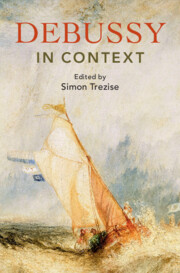Book contents
- Debussy in Context
- Composers in Context
- Debussy in Context
- Copyright page
- Dedication
- Contents
- Illustrations
- Contributors
- Preface
- Notes on the Text
- Abbreviations
- Part I Paris: City, Politics, and Society
- Chapter 1 Paris, the City
- Chapter 2 Paris and the Nation’s Politics
- Chapter 3 Beyond Paris
- Chapter 4 Feminine Beginnings: Women’s Critical Perspectives on Debussy (1897–1914)
- Chapter 5 Consumption and Leisure
- Part II The Arts
- Part III People and Milieu
- Part IV Musical Life: Infrastructure and Earning a Living
- Part V The Music of Debussy’s Time
- Part VI Performers, Reception, and Posterity
- Recommendations for Further Reading and Research
- Index
Chapter 5 - Consumption and Leisure
from Part I - Paris: City, Politics, and Society
Published online by Cambridge University Press: 23 May 2024
- Debussy in Context
- Composers in Context
- Debussy in Context
- Copyright page
- Dedication
- Contents
- Illustrations
- Contributors
- Preface
- Notes on the Text
- Abbreviations
- Part I Paris: City, Politics, and Society
- Chapter 1 Paris, the City
- Chapter 2 Paris and the Nation’s Politics
- Chapter 3 Beyond Paris
- Chapter 4 Feminine Beginnings: Women’s Critical Perspectives on Debussy (1897–1914)
- Chapter 5 Consumption and Leisure
- Part II The Arts
- Part III People and Milieu
- Part IV Musical Life: Infrastructure and Earning a Living
- Part V The Music of Debussy’s Time
- Part VI Performers, Reception, and Posterity
- Recommendations for Further Reading and Research
- Index
Summary
During this period consumerism developed apace, so that the society of Debussy’s world closely resembles our own in its fondness for shopping as a form of recreation. This was due in part to growing prosperity, at least amongst the middle classes, and increased leisure time. Fine dining, though hardly new, was also an aspect of growing consumerism. Debussy was a product of his time in his fondness for good food and collecting it. from local dealers. Especially pertinent to Debussy is the manner in which music was consumed as a leisure activity, for he catered for the demand for ‘leisure’ music in his early songs and piano works. Developing rapidly in this period of prosperity and stability was tourism, which Debussy participated in, if not from choice, certainly from the preferences of his wives and mistresses. Understanding this part of Debussy’s environment and appreciating Paris’s centrality on the European map (with many borrowings from Great Britain, including afternoon tea and whisky, both much to Debussy’s taste) throws light on Debussy the man as he negotiated the free time that many periods of inactivity as a musician created.
- Type
- Chapter
- Information
- Debussy in Context , pp. 45 - 56Publisher: Cambridge University PressPrint publication year: 2024

